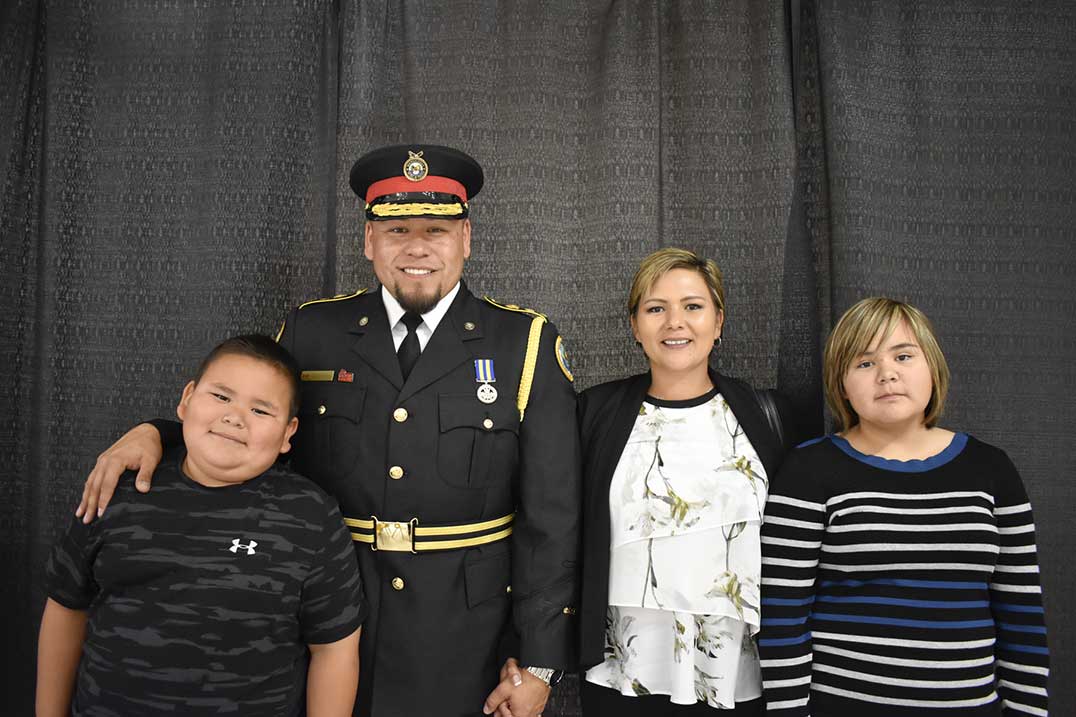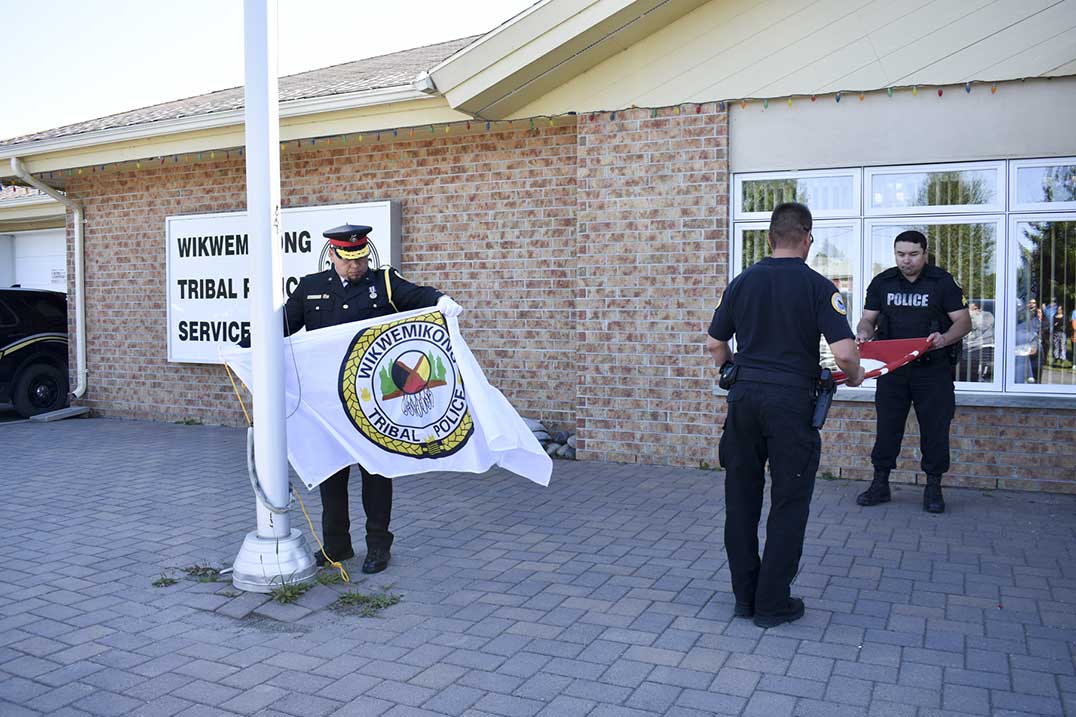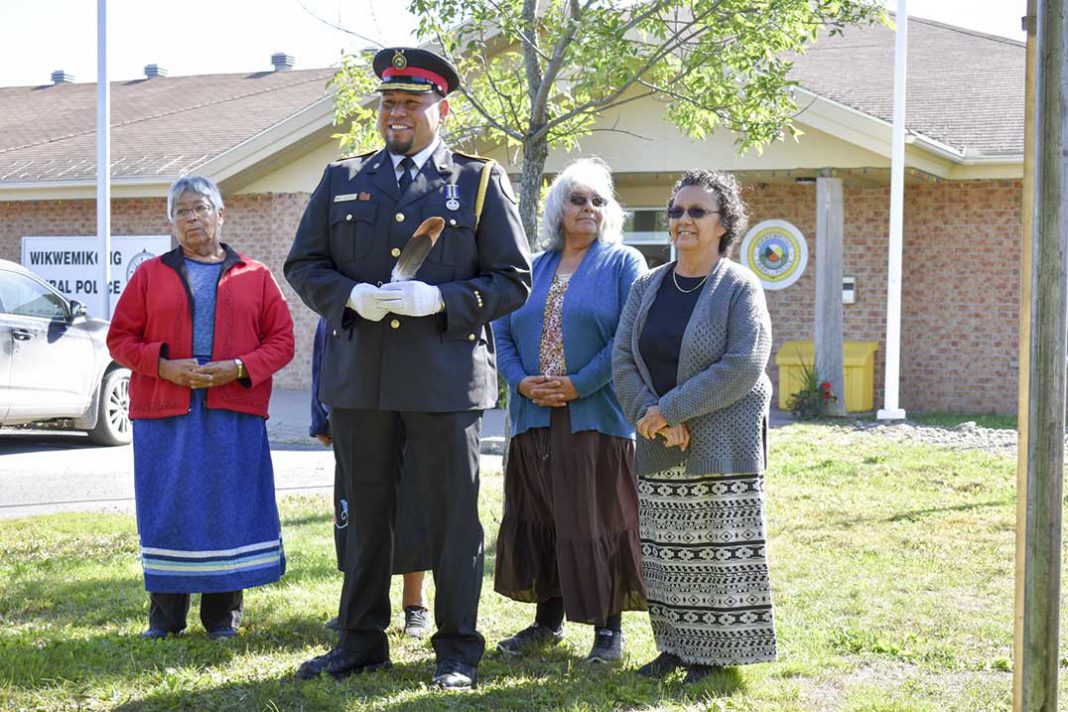WIIKWEMKOONG—On Tuesday, September 18, Wiikwemkoong Unceded Territory officially welcomed Terry McCaffrey, the new Chief of Police of the Wikwemikong Tribal Police Service, through ceremony based in traditional Anishinaabe values, teachings and customs.
The day of ceremony included a sunrise pipe ceremony, a ceremonial swearing-in, and a changing of the flag followed by a community feast held at the Wikwemikong arena.
The Anishinaabe ceremonial swearing-in, a collaboration between several Wiikwemkoong community agencies and programs, was the first ever conducted for a new Chief of Police of the Wikwemikong Tribal Police Service. The ceremony took place on the front lawn of the Wikwemikong Tribal Police Station and was emceed by Kerry Assiniwe of the Wikwemikong Health Centre Communication and Media Services.
Before the ceremonial swearing-in began, Roxanne Recollet, Wikwemikong Health Centre Wellness Facilitator, explained that four community elders, Dorothy Fox, Doreen Trudeau, Phylliss Williams-Kimewon and Rita Corbiere, all knowledge keepers of the culture and language, would be gifting Chief McCaffrey with an eight point star blanket and may offer to remain available to the Chief of Police should he ever wish to seek guidance regarding the community. She described how the four elder kweok would stand behind the Chief of Police, symbolizing their welcoming and support of him. Ms. Recollet also spoke about how the ceremony came about and said that the ceremony was significant in ensuring “that our new Chief of Police, Terry McCaffrey, will follow the seven grandfather teachings for the safety and wellness of our community.” She explained that Ms. Wassegijig-Kennedy, a long-time promoter of healing and wellbeing in the community, would smudge both the blanket and Chief McCaffrey while Harvey Bell Jr., one of the community’s natural helpers, sings an honour song after which the blanket would be wrapped around Chief McCaffrey and then the swearing-in ceremony would begin.
After the swearing-in component of the ceremony the new Chief of Police, with the assistance of Sergeant Greg Mishibinijima and Sergeant Todd Fox, conducted a ceremonial changing of the flag. The flag of Sergeant Greg Mishibinijima, who had been the interim acting police chief since retired Chief of Police Gary Reid left the position earlier this year, came down to make way for Chief McCaffrey’s new Wikwemikong Tribal Police Service flag.
When asked about the new Chief of Police, Ogimaa Peltier said that the community was “very excited to welcome Police Chief McCaffrey into our community to lead the Wikwemikong Tribal Police Service” and that in his short tenure thus far “since he commenced his position in late July it’s been nothing but positive experiences and positive interactions, not only with leadership, but also with the community.” He applauds Police Chief McCaffrey’s approach and remarked “the transition toward community policing” and noted how the community policing approach is being “filtered down to the officers who serve under McCaffrey’s leadership is very evident.”
Ogimaa Peltier concluded by saying, on behalf of the elected council, that “we continue to look to the community for their support of, not only Chief McCaffrey, but the Police Services as a whole to ensure the community realizes its goal for community wellness.” He explained that “the goal of the elected council is to ensure a safe, caring community for all of our citizens” and that the Wikwemikong Tribal Police Service is one of the agencies in place for that goal to be realized and that they are willing to work with other agencies in the community.

Ms. Recollet, who facilitated the swearing-in ceremony, expressed that it was an honour to be part of the ceremony and that the occasion, which she described as “coming together as a community to welcome our new chief of police” was a memorable one. She acknowledged that in order to run smoothly, such a momentous occasion requires effort from a lot of individuals and community programs and expressed gratitude to all those involved.
Although the swearing-in ceremony only happened formally on September 18, Chief McCaffrey assumed his duties as Chief of Police on July 30.
According to a community announcement released on July 18, Chief McCaffrey, Zhaawnong nini Naagaaniid, is an Anishinaabe from Pimichikamak (Cross Lake) in Northern Manitoba and a policing veteran with over two decades of experience. He has served in 37 different First Nation communities throughout Alberta, Manitoba, and Northwestern Ontario; most recently he served as detachment commander for the North Subdivision of the Treaty Three Police Service in Kenora. He began his career in 1996 as a trainee at the RCMP Training Academy, Depot Division in Regina Saskatchewan.
Chief McCaffrey’s extensive experience includes working as a front-line officer; a detective constable; a hostage and crisis negotiator integrated with the OPP Regional Team; and a training officer integrated with the OPP In-Service Training Unit providing BLOCK and firearms training. He has served as a detective sergeant in charge of crime, drugs, guns and gangs and has expansive experience from many local, regional and provincial boards in addressing human trafficking, harm reduction, and revising the provincial use of force model.
In a one-on-one conversation with Chief McCaffrey he spoke of his excitement to be in Wiikwemkoong Unceded Territory as well as in his new role, his philosophies on policing, immediate goals and priorities, and provided a small glimpse into his interests outside of work.

The conversation began with a discussion about a comment he had recently made at a community meeting in which he said that Wiikwemkoong Unceded Territory is not just a place where he works, but is also now his community. When asked about the comment, he described himself as a firm believer in principles in policing, one of which is the idea that “the people are the police and the police are the people” meaning there is no separation between the police officers working in the detachment and community members. He believes it’s imperative to carry this philosophy in order to be able to work as a police officer, in a good way.
This same principle seems to have also been shared by many members of the community that have welcomed him, his wife Arlene and their three children Michael, Mikayla and Kole. When talking about Wiikwemkoong, he said that “without a doubt, this community is the most welcoming” he has experienced is his lifetime. He spoke fondly of the “resounding welcome” his family has been receiving since their arrival and said that these welcomes come from a variety of places “from people at the coffee shop who recognize me from a Facebook post, or while shopping in the grocery store, to when I’m in full uniform and have people come up to me to say welcome.”
He hopes to see the recent positive momentum with Wikwemikong Tribal Police Service’s community involvement continue to grow, to continually see improvement in communications with the community, and to further integrate culture and tradition into the work of the Police Service.
One of the first goals he would like to see accomplished within the next three to six months, under his leadership, is a new strategic plan developed between officers, the police service board, and the community which would guide the police service’s operations.
He believes that the police service and the community have to work together through education, prevention, community mobilization and engagement to have a stabilized policing model and to ensure public and personal safety.
Chief McCaffrey also touched on one concern that community members have expressed to him, which he says warrants a “strong focus”: issues stemming from drugs coming into the community and the opioid crisis. He has seen how the opioid crisis has taken hold in different communities across the country and, he says that while he doesn’t mean that it has strongly taken hold here, he says it is “noticeable and it requires an address and a response from a policing standpoint, and most importantly, from a community standpoint.” Community involvement is imperative “because we can do as much enforcement as possible but if that need for substance abuse is still there the problem will remain.”
He believes that “part of making this a healthier, safer place for everyone” includes looking at the problem from all angles including treatment, prevention, education and enforcement in order to tackle these issues in the community.
For “those people out there that are selling these drugs and poisoning and hurting our people” and who would be working against this goal for a healthier, safer community, Chief McCaffrey says that they “need to know that they need to change their ways because their time of hurting our people is coming to an end.”
Based on resources, these concerns are “on the highest order” for Chief McCaffrey and the police service to address.
Clearly, getting to the position of chief of police is a long, challenging road requiring a lot of hard work, tough decisions and many sacrifices. Police Chief McCaffrey switches from tough talk on crime and policing to a softer, heartwarming tone when he acknowledges those most important individuals who have helped him get to where he is in his career today: his family. He credits his wife Arlene as his primary support and the one who keeps him grounded and assists him “with finding compassion in all things” and his children as the “constant reminders” of why he serves his community: “to keep it a secure and safe place for our children to live and grow.”
Policing is a demanding profession that can be tough on the whole family, which is why it’s important to find balance outside of career demands. To help keep him centred, Police Chief McCaffrey and his family like to get out on the land – “to go back to where it’s quiet” and to engage in land-based teachings. His family is a hunter-gatherer family that grew up on the trapline hunting and fishing. He explains that land-based teachings, including how to trap and hunt, as well as how to be “stewards of our environment and this land we were gifted” were always taught in his family.
Since arriving in the territory in July, Police Chief McCaffrey and his family have been exploring the community and the rest of the island as often as possible while boating and hiking and are excited for the coming fall harvesting season.
A self-professed Toronto Maple Leafs fan, the chief of police loves to play hockey himself and, as a goalie, he is looking forward to playing in net for the Wikwemikong Tribal Police Service in ongoing hockey games against the local schools.
While Chief McCaffrey is clearly looking forward to much in his new role, and in his new community, on this ceremonial day he paused to take a moment to reflect back on the day and said that it was “everything I hoped for and more” and commented that he was especially grateful for the outpouring of support and welcoming for him and his family from community members.
Special acknowledgement was provided to the natural helpers: Dorothy Fox, Doreen Trudeau, Phylliss Williams-Kimewon, Rita Corbiere, Dorothy Wassegijig-Kennedy, Harvey Bell Jr., and Gabriel Trudeau and the many Wiikwemkoong programs that assisted in the lead up to, and the day of, the ceremony.




